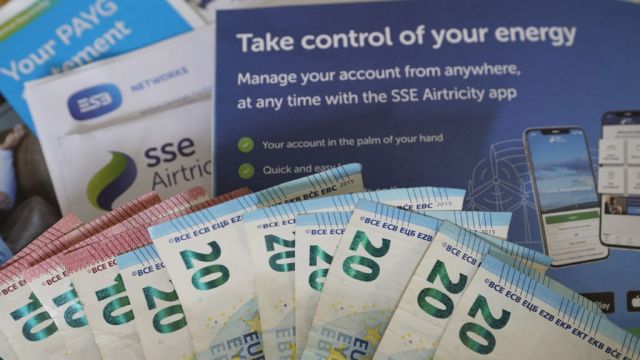Households are to be hit with extra annual charges of almost €40 on their electricity bills from October 1st to subsidise the generation of electricity from renewable energy sources.
Small commercial customers of electricity suppliers will also face increased charges over 12 months of almost €155.
The increases follow confirmation by the energy regulator on Thursday that the Public Service Obligation (PSO) Levy which will apply to all electricity customers from October 1st is required to be €251.79 million.
The figure is almost €27 million higher than the provisional estimate of €225 million announced by the Commission for Regulation of Utilities in June.
The PSO Levy for the previous 12-month period had been set at zero.
The increase will result in a monthly PSO levy of €3.23 for domestic electricity customers or €38.76 per annum from October.
For small business customers, the change will result in a monthly increase of €12.91 on their electricity bills or €154.92 in a full year.
The PSO levy is set annually to subsidise the cost of generating electricity from wind farms and solar panel operations.
The CRU said the increase in the PSO Levy for the coming year above its original estimate was due to a review of all data received by energy suppliers.
However, it also pointed out that changes in foreign exchange rates and forward fuel and carbon prices had contributed to keeping the size of the PSO Levy down.
The CRU said the PSO Levy is key to enabling Ireland to meet its national targets for generating electricity from renewable sources.
“The PSO is key in supporting renewable projects which play a vital role in lowering carbon emissions, reducing the impact of fossil fuels on the environment and reducing our dependency on countries which export fossil fuels,” the CRU said.
The regulator said the estimated generation and wholesale electricity market prices for the year ahead remained the key driver in setting the PSO Levy.
The CRU also pointed out that there is an inverse relation between the PSO Levy and wholesale electricity prices so that the unit cost of electricity could be expected to fall in tandem with the proposed increase in the levy.
The PSO Levy currently supports 4,459.3 Megawatts of renewable generation in Ireland.
Updated statistics show wind generation contributed 33 per cent of all electricity generated in the Republic in April, while electricity generated from solar power accounted for two per cent of the total.
It is estimated domestic customers will account for 34.7 per cent of peak demand for electricity over the coming year.
The CRU said it appreciated the burden of high energy prices that customers have endured recently and that anything adding to that burden was “unwelcome.”
It pointed out that the PSO Levy set in 2022/23 had reduced the annual electricity bill for households by €90.
The regulator also reminded customers that they can save money on their electricity bills by switching supplier and through energy efficiency.
Electricity bills are currently estimated to be around 70-80 per cent above pre-energy crisis levels.
The latest increase is likely to place pressure on the Government to continue to provide energy credits to domestic electricity customers in the year ahead.
Total credits of €450 to be spread over three instalments of €150 were announced in Budget 2024 last year with the final payment made between March and April 2024.
Media reports at the weekend indicated another €450 in energy credits expected to be announced in October’s budget would be “frontloaded” this year in a pre-election bonanza for voters.
The Government still has to decide if it will extend the VAT reduction on electricity and gas bills from 13.5% to 9% which was initially introduced in mid-2022.







